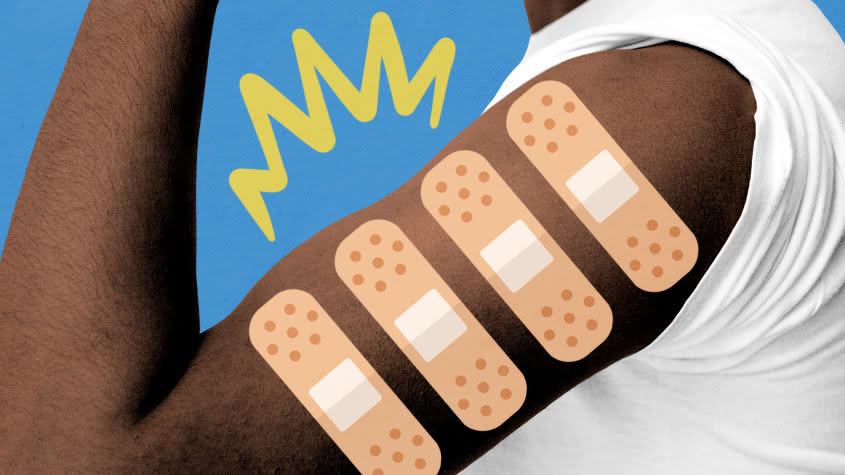The next round of COVID-19 booster shots, explained

- Oops!Something went wrong.Please try again later.
Back in March, U.S. health regulators recommended a second COVID booster shot for both the immunocompromised ages 12 and up and adults over 50. Now, as a pair of highly-infectious Omicron subvariants drive up cases nationwide, discussions of expanded booster eligibility and even an Omicron-specific shot have again taken center stage. Here's everything you need to know:
Who would updated booster eligibility affect?
The Biden administration is currently pushing to expand booster eligibility for all U.S. adults, though the decision will ultimately require sign-off from both the Food and Drug Administration and the Centers for Disease Control and Prevention. Discussions with officials from each agency are expected in the coming days, The New York Times reports per individuals familiar with the matter.
Both the White House Coronavirus Coordinator Dr. Ashish Jha as well as infectious diseases expert Dr. Anthony Fauci also reportedly back the plan for expansion, the Times and The Washington Post note. In a Monday interview, Fauci told the Times he believes there should be "flexibility and permissiveness in at least allowing" for younger adults.
Though the advent of at-home testing has made it difficult to get an exact grip on the situation, there are strong indications that both COVID cases and hospitalizations are rising nationwide, NPR notes. According to the Post's rolling seven-day average, approximately 112,000 new cases have been reported per day, though the actual number is likely much higher. Expanding eligibility would help protect those who received their first booster months ago, at which point immunity is expected to wane. It would also allow officials to "use vaccine doses that are reaching their expiration dates and would otherwise be discarded," the Post adds.
Are there any concerns about adding a second booster for all adults?
Some federal officials feel the White House should be doing more to increase initial two-dose vaccination rates rather than pushing incremental protection for those already at least somewhat shielded, the Times notes. Speaking with the Post, outside adviser to the FDA Paul Offit described federal officials' current attitude as one of "booster mania."
"I do think [a second booster shot] does make sense for certain groups, but a universal boosting strategy doesn't make sense," Offit said Monday. He also warned of the possibility of "imprinting," when an individual's immune system latches onto one targeted response and struggles to evolve alongside the virus. "As you continue to boost with the same ancestral strain, you lock yourself into that response," Offit continued. "Should there ever be a virus that is truly resistant to protection against serious illness ... you need to start all over again and give that vaccine."
There's also the concern that "by promoting second boosters for all adults now, the administration could weaken its argument for reformulated booster shots in the fall, when it hopes to offer boosters that better combat the latest versions of the virus," the Times goes on. But hopefully, the administration will move quickly to broaden eligibility so as to avoid such confusion, officials told the Post.
Wait — what's this about Omicron-specific shots?
The FDA at the end of June said it had advised COVID-19 vaccine manufacturers Pfizer and Moderna to update their booster formulations to target the Omicron variant and its many derivatives. Both manufacturers believe such an offering could be ready by the fall, with Pfizer having estimated early October and Moderna late October or early November.
All COVID vaccines thus far have targeted just the "ancestral virus," or the original form of coronavirus found in Wuhan, China in 2020, Scientific American reports. The new boosters, as recommended by the FDA, will target both the BA. 4 and BA.5 Omicron subvariants, both of which are currently circulating in the U.S. That said, however, "there is no guarantee that BA.4 and BA.5 will still predominate when the fall booster campaign begins," Scientific American writes per Archana Chatterjee, a member of the FDA's vaccine advisory committee. The shots are expected to also target earlier subvariants, for which Pfizer and Moderna had already begun developing a specific booster prior to the FDA's June guidance, per CNBC.
The White House's Dr. Jha has said that receiving a second booster dose now, if recommended by regulators, would not prevent individuals from receiving a reformulated dose in the fall, the Times reports. Only those who have received their initial series of shots would be eligible for the Omicron booster. Other eligibility guidelines have yet to be released.
Should I wait until the fall to get my fourth shot?
For those debating whether to get their second booster now or to wait until the fall, infectious disease expert Monica Gandhi recommends considering a few factors.
"I would advise — depending on case rates in your area and your age — getting the fourth dose now," Gandhi told Bloomberg. "And then deciding what to get in the fall."
Ashley St. John of Duke-NUS Medical School seemed to agree: "Those who are eligible to take a booster should do it now," she told Fortune.
You may also like
Amazon's epically expensive Lord of the Rings show gets a stunning new trailer
The newly-resurfaced debate on Biden's age and mental fitness
Ukraine strikes behind Russian lines with long-range launchers from the West
